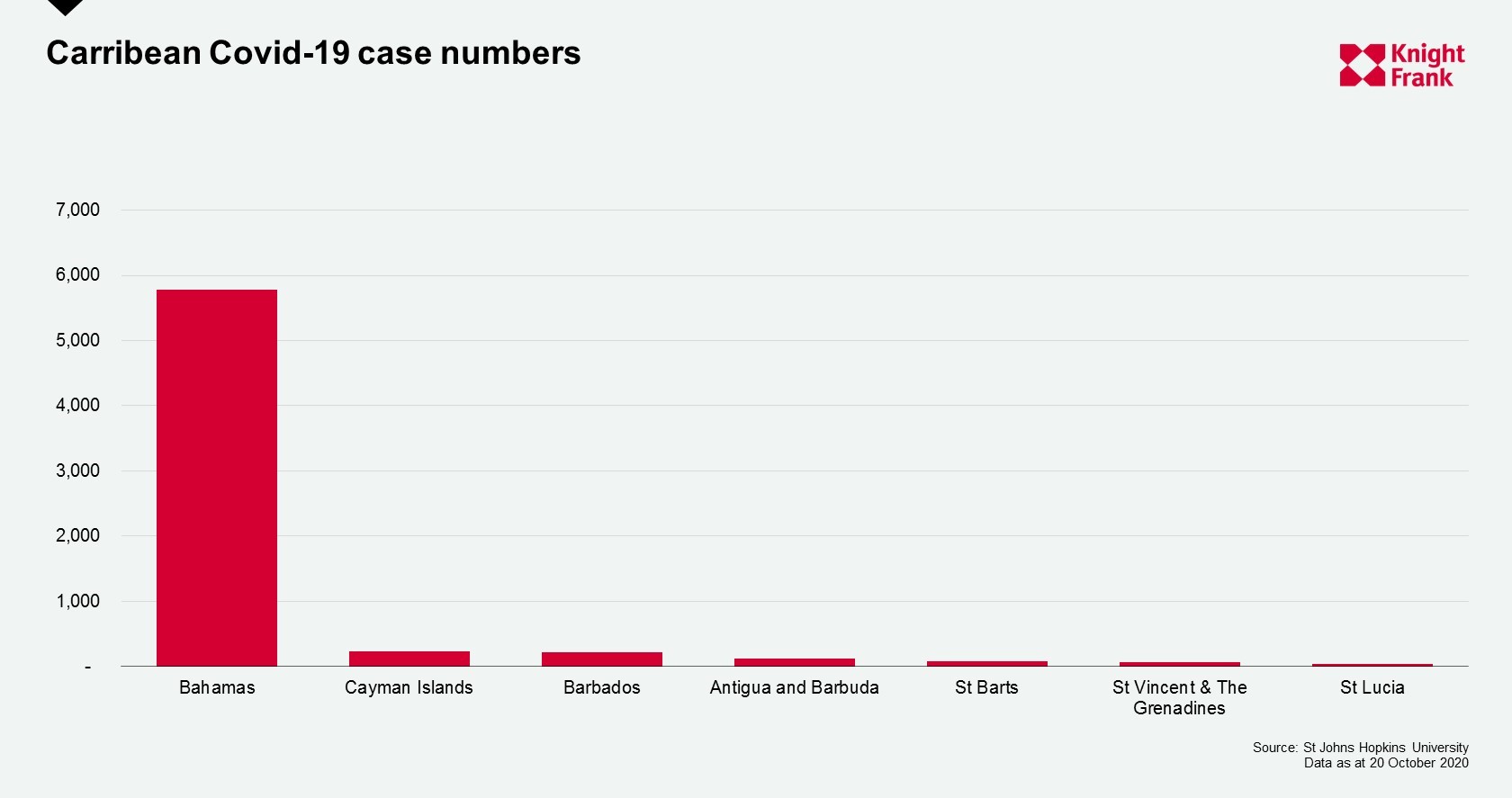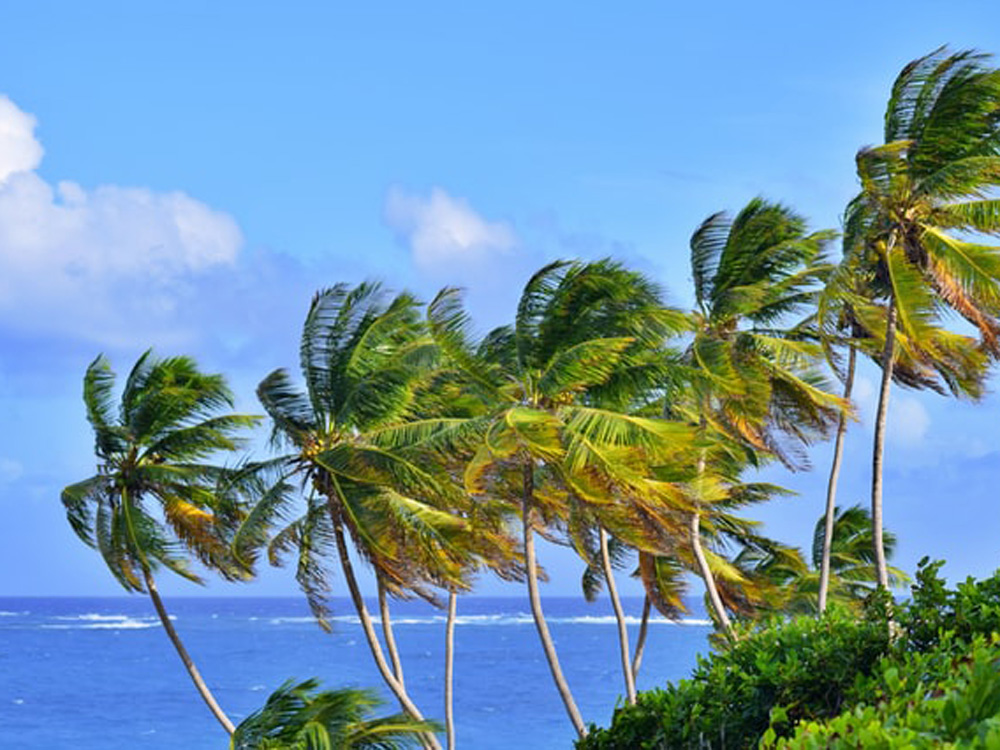The Caribbean cautiously opens its doors
Europe may be locking down, but the Caribbean is preparing to welcome tourists once more, with new ‘nomad visas’ driving both rental and buyer demand
5 minutes to read
With large parts of the world seeing second or third waves of the virus, the Caribbean has so far weathered the pandemic better than most regions, closing airports and keeping infection rates low.
According to Johns Hopkins University, most islands have seen fewer than 300 cases since the start of the crisis, with some such as St Lucia identifying just 36 cases. As we enter the start of the Caribbean tourist season, markets are opening up, but with strict test and trace measures in place.

The rise of the nomad visa
With tourism accounting for between 8% and 40% of GDP across the Caribbean islands, governments are turning to ‘nomad visas’ to attract visitors and boost their economies. Barbados was first off the mark, announcing its welcome stamp visa in July, with The Bahamas following suit and more recently the Cayman Islands has outlined plans to commence a ‘global citizenship programme’.
With more of the world’s population no longer tied to an office location and with many families home schooling, the prospect of relocating to sunnier climes during the winter months is a tempting one.
Knight Frank data suggests such government initiatives can influence rental and buyer demand. Back in July we highlighted how our online enquiries surged 65% in the weeks after Barbados’s visa announcement and the New York Times reported that more than 1,000 applications were submitted in the first week of the programme.
According to Knight Frank’s Head of Caribbean Sales, Edward de Mallet Morgan, “Long term rental demand is often a precursor of sales activity and while we would usually see people head to the Caribbean for a two to three week holiday, our local teams are seeing bookings for two to three months and in some cases this is leading to sale enquiries as buyers explore the islands and like what they have to offer.”
Edward adds, “Many of the islands have invested heavily in internet connectivity making remote working a truly viable option.”
Andrew Blandford-Newson, Senior Negotiator at Knight Frank confirms that it’s not all about lifestyle, “International buyers are also looking to diversify their assets given the global economic uncertainty and with several of the region’s currencies pegged to the US dollar this affords them some security.”
“In addition, prime prices in some markets are at decade-lows, for those that have been sat on the side-lines for some time they are recognising this juncture as a buying opportunity.”
Covid-19 and the impact on the property market
• Barbados: Viewings increased 34% in Q2 2020 year-on-year with the island’s South and West coasts attracting strong interest. Sales continue to progress with buyers achieving average discounts of 11% off the asking price in Q2 2020 according to our partners at Terra Caribbean.
• British Virgin Islands (BVI): Three years after Hurricane Irma, the BVI was showing signs of recovery at the start of 2020 and this is building once helped by a stamp duty holiday for locals or ‘belongers’..
• St Barts: A French territory, and arguably one of the least impacted by the pandemic, the island reopened on 22 June and sales have progressed since this time and the landmark Eden Hotel in Baie de St Jean reopened in October.
• The Bahamas: Particularly reliant on US demand with strong links to Miami, the island has seen a large number of cases and intermittent lockdowns throughout the summer. Luxury demand has been focused on the main private estate communities in Nassau/New Providence and for private islands in the Exumas, with some increasing interest in other main Bahamas islands.
• Mustique: An island comprised of some 100 villas with the Cotton House Hotel at its heart, has remained virus-free and several sales exchanged over the summer months. Regular visitors to the island used to renting a property for two or three weeks at Christmas and in February half term are now considering a purchase enabling them to have a permanent retreat.

Current travel rules:
• Barbados: New travel protocols were set out by the Barbados Government from 16th October 2020. Unless travelling from a small number of low-risk countries, visitors must take a test within three days of travel and submit it online. New arrivals must stay in their resort for two days until a second test is taken after which they are free to travel around the island but should log their temperature each day. Our partners at Blue Sky Luxury (Barbados) have been approved by the government to rent out villas which are ‘safe’ for guests to use as their ‘site’ for quarantine.
• British Virgin Islands: Premier Andrew Fahie has announced the country will open to tourists on 1 December 2020, and “use technology” to reduce risk, though details of protocols and testing rules have yet to be announced.
• St Barts: A French territory St Barts reopened to tourists on 22 June. Visitors are required to show a negative Covid-19 test within 72 hours of their arrival. Visitors staying longer than 7 days will be required to take a second test in St. Barts on the 8th day following their arrival.
• The Bahamas: From 1 November 2020, arrivals are due to be allowed free movement around the island, but with a triple-testing programme. Visitors must have a negative test the week before travelling, allowing them to apply for a “health visa” online. They will be tested again on arrival and on day five of their visit.
• Mustique: Part of St Vincent and the Grenadines, from 1st September 2020 guests have been permitted to travel to the island. No quarantine is necessary provided a negative test result is submitted five days or less prior to arrival). There may be the need for an additional test on arrival.
Please note that this information is accurate at time of issue but may be subject to change
Sign up to our Caribbean research here
Please get in touch if we can help with any property requirements in the Caribbean you may have:
Andrew Blandford-Newson
Edward de Mallet Morgan
Main photo by Anthony Ingham on Unsplash